Dear SMART TD,
Today the Trump administration did everything it could to stop all railroad crew safety issues.
In a Federal Register posting published at 4 p.m. today, the FRA formally withdrew the pending proposed rulemaking dating from 2016 that would have set a mandatory crew size on freight and passenger trains.
Withdrawal of Notice of Proposed Rulemaking: Train Crew Staffing | Federal Railroad Administration
But the notice went much further than that. It announced that not only will FRA turn a blind eye to the unsafe practices of single-person or no-person trains, the agency claims that its notice also nullifies all state laws and regulations that establish minimum crew standards.
President Donald Trump, DOT Secretary Elaine Chao and FRA Administrator Ron Batory have taken sides, and it’s with the railroads that want to eliminate operating crew members to the detriment of rail safety and to the detriment of the communities through which our members operate trains. We are considering legal action and other avenues to protect our members and the American public from the prospects of driverless trains.
The action today flies in the face of so-called conservative values and state’s rights. The federal government is refusing to protect the public and at the same time is prohibiting states from doing so by posting this federal notice.
This action undermines my faith in the FRA in being a fair and impartial overseer of safety in the railroad industry. Clearly, the railroad CEOs have their folks in power with President Trump and his administration. This action should put an end to any thoughts that this president and this administration is supportive of railroad workers.
It is now more important than ever that we pass a federal law requiring that every train in America have a minimum of two crew members. Those two crew members must be a federally certified conductor and a federally certified locomotive engineer.
It’s time to not only send an email message to your member of Congress, but it is time for every operating railroad worker to contact their member of Congress personally. Call their offices and ask to meet with them today.
We will not be stopped by today’s terrible decision. It makes us more committed than ever to pass a federal two-person crew law.
In solidarity,
John Risch
National Legislative Director
SMART Transportation Division
Author: bnagy
The Minnesota House of Representatives has passed H.F. 286, Minimum Train Crew Requirement, a stand-alone version of two-person crew legislation.
The bill, sponsored by state Rep. Frank Hornstein, passed Wednesday, May 15, by a 78-52 vote along party lines with the DFL majority and several Republicans voting for the bill or abstaining. H.F. 286 now moves to the Minnesota Senate where state Sen. Scott Dibble is the chief author.
However, the route to passage into law is currently in the hands of H.F. 1555, the Transportation Omnibus bill, as Section 97.
“This legislative pathway remains our only viable way to passage into law this year,” said SMART TD Minnesota State Legislative Director Phillip Qualy. “We need the vocal support of members and retirees alike in the state in order to pass in the state Senate.”
Qualy encourages members, retirees and their friends and family to call or email the Republican state senators on the H.F. 1555 Conference Committee and ask them to pass Section 97, Minimum Train Crew Requirement this year. They can call and spell out the important public safety aspects and assistance to first responders that two-person crews provide in the case of a railroad emergency as well as general operations such as train securement, uncoupling road crossings, and local safety hazards in their area, Qualy said.
A list of key senators to be contacted appears below.
Minnesota residents largely understand that legislation requiring two people on a freight crew is key to safe railroad operations, according to Qualy and the Minnesota State Legislative Board, but the message might not be as clear for the legislators.
“We need all railroad workers standing together in support of this legislation,” he said. “We need all of our members and retirees to make your calls and emails today.”
The Minnesota Legislative Board’s submission to the Federal Railroad Administration on why train automation is a bad idea also spells out arguments about why two-person crews are important.
Members of the Minnesota State Senate who should be contacted include:
- Senate Majority Leader Paul Gazelka (R – Brainerd): 651-296-4875, Contact: www.senate.mn/members/member_email_form.php?member_id=1169
- Senate Transportation Chairman Scott Newman (R – Hutchinson): 651-296-4131, Email: sen.scott.newman@senate.mn
- Senate Transportation Committee Vice Chairman John Jasinski (R – Faribault): 651-296-0284, Contact: https://www.senate.mn/members/member_email_form.php?member_id=1227
- Senate HF-1555 Conference Committee Member Dan Hall (R – Burnsville): 651-296-5975, Contact: https://www.senate.mn//members/member_email_form.php?member_id=1182
- Senate HF-1555 Transportation Committee Member Jason Rarick (R – Brook Park): 651-296-1508, Contact: https://www.senate.mn//members/member_email_form.php?member_id=1240
- Senate Public Safety/Judiciary Chairman Warren Limmer (R – Maple Grove): 651-296-2159, email: sen.warren.limmer@senate.mn
- Senate Transportation Committee member David Senjem (R – Rochester): 651-296-3903, email: sen.david.senjem@senate.mn
Police continue to search for two suspects in the attempted robbery of a SEPTA conductor May 10 that ended with the conductor being shot in the hip.
A $6,000 reward has been offered and video footage showing the suspects in the Carpenter Station incident has been released to the media, NBC10 in Philadelphia reports.
The victim was hospitalized after being shot in the hip, and his name was not released to the media. An officer from Local 61 (Philadelphia, Pa.) said that he is a SMART TD member.
Read the NBC 10 story and watch the video showing the suspects.
The advocacy and hard work of SMART Transportation Division members and retirees, the Nevada State Legislative Board and a coalition that included Sheet Metal brothers and sisters, other rail unions and safety-conscious members of the public has paid off.
Nevada Gov. Steve Sisolak signed A.B. 337 on May 15. Two-person crews are now required on Class I and II freight trains being operated in the state or the carriers will face steep fines.
The bill’s signing caps a massive effort by SMART TD members that spanned years in the face of carrier opposition.
“This law didn’t pass by accident. It was the hard work of Jason Doering, our Nevada state legislative director, and others that made it happen,” SMART TD National Legislative Director John Risch said. “We all owe Jason and others who worked on this our thanks for keeping train operations safe in Nevada, for not just those who operate trains but for the public as well.”
Doering and his board assembled a group of dedicated advocates who helped to spread the important message about how crew size is, first and foremost, about keeping communities safe.
“Many people helped to get the word out about the public safety ramifications of this legislation,” Doering said. “Those concerted efforts paid off, and now we’ve ensured that the state’s railways stay safe with two crew members in each freight train’s cab.”
The legislation was sponsored in the State Assembly by Susie Martinez, a Teamster who, Doering said, “treated him like family” and whose staffer, Carlos Hernandez, assisted in the early stages of getting the bill passed.
Additional backers included Assemblywoman Maggie Carlton, also a primary sponsor of the legislation, as well as Assemblywoman Shea Backus, who testified before the state Senate and expressed strong support during an Assembly Growth and Infrastructure Committee hearing, and Assemblyman Richard Carrillo, another co-sponsor whose father was a United Transportation Union member.
“Really — all of the Nevada Assembly and Senate Democrats, as well as the governor, receive my thanks for their understanding of the important protection to public safety that this law provides,” Doering said. “There is too much risk involved in transporting hazardous materials and goods across our country and through our communities to have a single crewmember on trains that are a mile long or even longer.”
The law establishes fines of $5,000 for a first offense, $10,000 for a second offense within three years and $25,000 for a third and all other offenses for Class I and II carriers that operate freight locomotives without at least two people in the cab. Hostling and helper services are not covered by the law.
Doering and his board were stung by the 2017 veto by then-Gov. Brian Sandoval, a Republican, of S.B. 427, a prior try at two-person crew legislation that had passed both houses of the Nevada state Legislature.
But a change in leadership brought a new opportunity with Sisolak’s election last year.
“No doubt we were disappointed in 2017, but this is a prime example of how elections matter,” Doering said. “We cracked open the door with our previous effort and laid the groundwork. With that change in leadership in the state Capitol, it was opened even wider.”
The Nevada State Legislative Board especially wanted to thank members from SMART’s Sheet Metal Local 88 out of Las Vegas, who helped to amplify the message.
“They were an extraordinary help!” Doering said. “Jeff Proffitt and Alfonso Lopez — we couldn’t have moved anything without their support. Sheet Metal put rail labor on the map in Nevada.”
Also advocating for the legislation was Fran Almaraz, who helped set up meetings and facilitated a relationship with legislative leadership, Doering said.
Assisting the cause as well were TD Colorado State Legislative Director Carl Smith, who provided guidance after succeeding earlier this year in getting two-person legislation made into law in his state, Dean Mitchell, who helped in researching and targeting the message and the TD Public Relations Department, which helped to compose an op-ed published by the Nevada Independent and put together print material to get the word out about the legislation.
And, as he did with S.B. 427, Brotherhood of Locomotive Engineers and Trainmen’s Nevada State Legislative Board Chairman Matt Parker mobilized BLET members to advocate loudly in favor of the legislation.
“It truly was a team effort,” Doering said.
A.B. 337 was approved April 23 by the State Assembly by a 29-12 vote and in the state Senate on May 7 by 13-8 margin. Both votes were party line with Democrats voting in favor of the legislation.
Nevada now joins Arizona, California, Colorado, West Virginia and Wisconsin as states that have legislation requiring two people to operate freight trains.
“This successful passage in Nevada proves that our persistence pays off,” Risch said. ”Concerning two-person crews, the message of public safety did not change from two years ago and will not change going forward. It’s that simple. Two crew members are vital to ensuring that these trains are operated safely and that our communities are secure.
“Legislators in Nevada knew this before, and they know it now. As a result of the 2018 election, the leadership in the governor’s office changed and now this safety-focused, common-sense bill has been made law.”
A.B. 337 takes effect Oct. 1.

“The proposed revisions would modernize locomotive engineer certification regulations to match those for train conductors, and provide regulatory efficiencies and cost savings without compromising safety,” FRA Administrator Ronald L. Batory said. “The proposal would streamline the engineer certification process, and reduce paperwork burdens for the responsible parties.”
The proposed rule would adopt the conductor certification regulation process established in 2012 by making conforming amendments to the engineer certification regulation, which was first issued in 1991 and last amended in 2000. Consistent with Executive Order 13771, the proposed rule would reduce overall regulatory reporting and cost burdens for railroads and locomotive engineers. Harmonization of the conductor and engineer regulations would also provide greater clarity to locomotive engineers.
The NPRM includes the following five proposed changes to Title 49 of the Code of Federal Regulations, Part 240:
- Clarifies locomotive engineer certification requirements (Part 240) and aligns them with conductor certification requirements (Part 242) to make it easier for railroad certification managers to become familiar with and administer both regulations.
- Reduces the reporting burden of a person’s former employer to clarify that only certain listed information in the individual’s railroad service record that directly relates to FRA’s requirements in the certification regulation needs to be shared.
- Defers the requirement for railroads to seek a waiver from annual testing of certified locomotive engineers when individuals take an extended absence from performing service requiring certification.
- Modernizes the dispute resolution process by reducing the paperwork burdens for both employees and railroads and allowing for web-based dockets.
- Simplifies the submission process by which qualification and certification programs are modified by allowing electronic submissions.
The proposed revisions for locomotive engineer qualification and certification ensure that certain provisions are consistent, to the extent possible, with those for conductors. FRA is seeking comments on the proposed rule, and will address comments received when preparing a final rule. Comments may be submitted to the docket for the proceeding FRA-2018-0053, and are due by July 8, 2019. Read the full proposed rule here.
The Nevada State Legislative Board reports that A.B. 337, legislation requiring two people in the cab of freight trains in the state, passed in the state Senate on Tuesday by a 13-8 party-line vote.
The bill is in the process of enrollment — receiving signatures from both the Senate and General Assembly leadership — and is expected to be on Gov. Steve Sisolak’s (D) desk for his signature in the coming weeks, Nevada State Legislative Director Jason Doering said.
If the bill is signed by Sisolak, Nevada would become the second state this year to successfully enact two-person crew legislation. A bill in Colorado was signed into law on March 21.
A bill in Maryland (H.B. 66) has successfully passed both houses of its Legislature and is awaiting action by Gov. Larry Hogan.
Two-person crew legislation also is progressing in Minnesota (part of H.F. 1555, an omnibus transportation bill) and in Illinois (S.B. 24). The support of members in both states is important for both pieces of legislation to be passed.
Minnesota residents can contact these legislators to show support for the Minnesota bill.
- Senate Majority Leader Paul Gazelka (R – Brainerd): 651-296-4875, Contact: www.senate.mn/members/member_email_form.php?member_id=1169
- Senate Transportation Chairman Scott Newman (R – Hutchinson): 651-296-4131, Email: sen.scott.newman@senate.mn
- Senate Transportation Committee Vice Chairman John Jasinski (R – Faribault): 651-296-0284, Contact: https://www.senate.mn/members/member_email_form.php?member_id=1227
- Senate HF-1555 Conference Committee Member Dan Hall (R – Burnsville): 651-296-5975, Contact: https://www.senate.mn//members/member_email_form.php?member_id=1182
- Senate HF-1555 Transportation Committee Member Jason Rarick (R – Brook Park): 651-296-1508, Contact: https://www.senate.mn//members/member_email_form.php?member_id=1240
- Senate Public Safety/Judiciary Chairman Warren Limmer (R – Maple Grove): 651-296-2159, email: sen.warren.limmer@senate.mn
- Senate Transportation Committee member David Senjem (R – Rochester): 651-296-3903, email: sen.david.senjem@senate.mn
If you are a resident of Illinois, follow this link to find your state legislators and help to keep up the momentum for S.B. 24.
The national two-person crew bill, the Safe Freight Act (H.R.1748), introduced in March has 38 co-sponsors.
Follow this link to send an email to your representative in support of the national Safe Freight Act.
U.S. Sen. Jerry Moran (R) of Kansas is putting a delay on the consideration by the U.S. Senate of three nominees to the Amtrak Board of Directors and wants a solid commitment from the carrier that the long-distance Southwest Chief route will be preserved.
Amtrak President and CEO Richard Anderson has arranged a meeting later in May with Moran and other senators who represent states that host the daily Chicago-to-Los Angeles route to discuss the Southwest Chief’s future, according to a report published by the Topeka Capital-Journal.
The three Amtrak board nominees are Rick Dearborn, Joseph Gruters and former U.S. Rep. Lynn Westmoreland. SMART TD opposes Westmoreland’s nomination.
The future of the Southwest Chief has been uncertain with Amtrak leadership first targeting it because of Positive Train Control concerns and a proposed “bus bridge” being looked at as an option to avoid placing the technology on some trackage. Last year, U.S. senators had to pressure the carrier to continue the route, which serves many rural areas, through the 2019 fiscal year.
Read the full story on the Topeka Capital-Journal website.
A workers summit for union members from all over Nebraska is scheduled to take place on Monday, May 6 in North Platte, Nebraska.
Jim “Doc” Moore, a retired associate professor of labor history at Cornell University’s School for Industrial and Labor Relations, will moderate the meetings at 1 and 5 p.m. at the Ramada Inn and Suites, 2102 S. Jeffers St., North Platte, NE 69101.
Among scheduled presenters at the summit, which is open to all union members and their spouses, are Sue Martin, president of the Nebraska AFL-CIO; John Kretzschmar, director of the William Brennan Institute for Labor Studies at the University of Nebraska at Omaha; and SMART TD Nebraska State Legislative Director Bob Borgeson.
The summit is again being organized by Terry Sigler, a retired legislative representative of SMART TD Local 286 in North Platte who remains active in union matters, especially when it comes to safety. Among topics discussed at the successful inaugural meeting in April 2018 were the state’s two-person crew bills and OSHA funding.
“The purpose of the Workers Summit is to unite all the unions to better inform the membership of the issues that are important for their safety and welfare,” Sigler said.
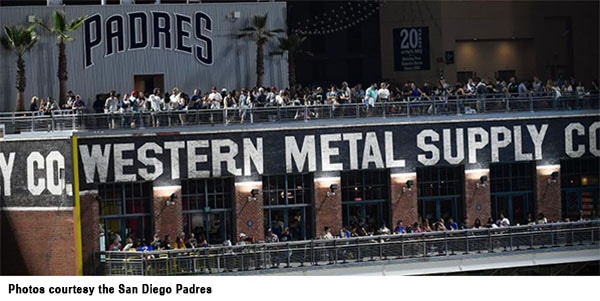
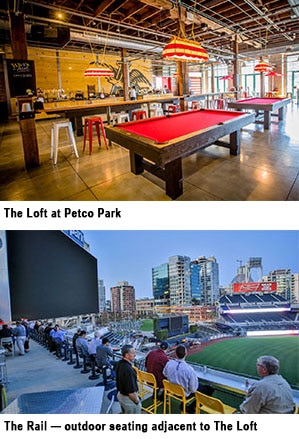 Food, fun and baseball will be the name of the game as registered meeting attendees watch the Padres take on the National League West rival San Francisco Giants at the Padres’ home field, a short walk from the host Hilton Bayfront Hotel.
Food, fun and baseball will be the name of the game as registered meeting attendees watch the Padres take on the National League West rival San Francisco Giants at the Padres’ home field, a short walk from the host Hilton Bayfront Hotel.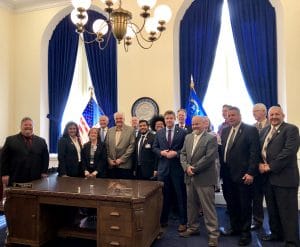
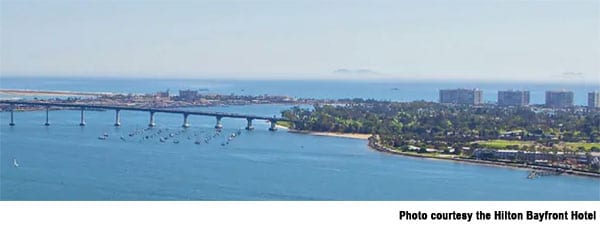 A pair of tours has been finalized on June 30 and July 1 for attendees of the
A pair of tours has been finalized on June 30 and July 1 for attendees of the 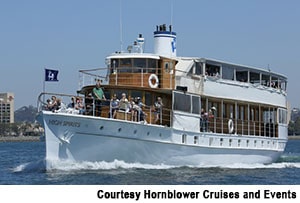 Day 1 (June 30): High Spirits Hornblower yacht luncheon/tour: Attendees will be picked up at the hotel dock at 9:45 a.m. to enjoy sightseeing on San Diego Bay with a professionally narrated harbor tour. More than 50 historic landmarks are covered by the 13-mile Big Bay cruise. Attendees will enjoy lunch on board and see marine animals and majestic sea birds on High Spirits, which was originally constructed as a sister ship to President Franklin D. Roosevelt’s presidential yacht, the Sequoia. Attendees will arrive back at the dock at 1 p.m., giving them time to spare to visit Seaport Village, which is within walking distance, before the Regional Meeting’s opening reception Sunday evening.
Day 1 (June 30): High Spirits Hornblower yacht luncheon/tour: Attendees will be picked up at the hotel dock at 9:45 a.m. to enjoy sightseeing on San Diego Bay with a professionally narrated harbor tour. More than 50 historic landmarks are covered by the 13-mile Big Bay cruise. Attendees will enjoy lunch on board and see marine animals and majestic sea birds on High Spirits, which was originally constructed as a sister ship to President Franklin D. Roosevelt’s presidential yacht, the Sequoia. Attendees will arrive back at the dock at 1 p.m., giving them time to spare to visit Seaport Village, which is within walking distance, before the Regional Meeting’s opening reception Sunday evening.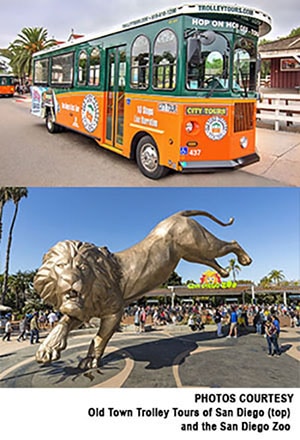 Day 2 (July 1): Old Time Trolley ride and visit to the San Diego Zoo: Attendees will take a trolley from the Hilton Bayfront Hotel at 8:45 a.m. and travel to the world-renowned San Diego Zoo, home to thousands of exotic animals. Guided bus tours of the 100-acre zoo will allow visitors the chance to encounter the zoo’s more than 3,500 rare and endangered animals representing more than 650 species and subspecies and its prominent botanical collection with more than 700,000 exotic plants. A slate of wildlife shows and an airborne shortcut over the treetops will give visitors an unforgettable experience as they encounter the zoo’s animal and plant collection and surrounding Balboa Park. Lunch vouchers provided on the tour will allow attendees to customize their visit to their interests, and the tour group will return to the hotel at about 3:30 p.m.
Day 2 (July 1): Old Time Trolley ride and visit to the San Diego Zoo: Attendees will take a trolley from the Hilton Bayfront Hotel at 8:45 a.m. and travel to the world-renowned San Diego Zoo, home to thousands of exotic animals. Guided bus tours of the 100-acre zoo will allow visitors the chance to encounter the zoo’s more than 3,500 rare and endangered animals representing more than 650 species and subspecies and its prominent botanical collection with more than 700,000 exotic plants. A slate of wildlife shows and an airborne shortcut over the treetops will give visitors an unforgettable experience as they encounter the zoo’s animal and plant collection and surrounding Balboa Park. Lunch vouchers provided on the tour will allow attendees to customize their visit to their interests, and the tour group will return to the hotel at about 3:30 p.m.